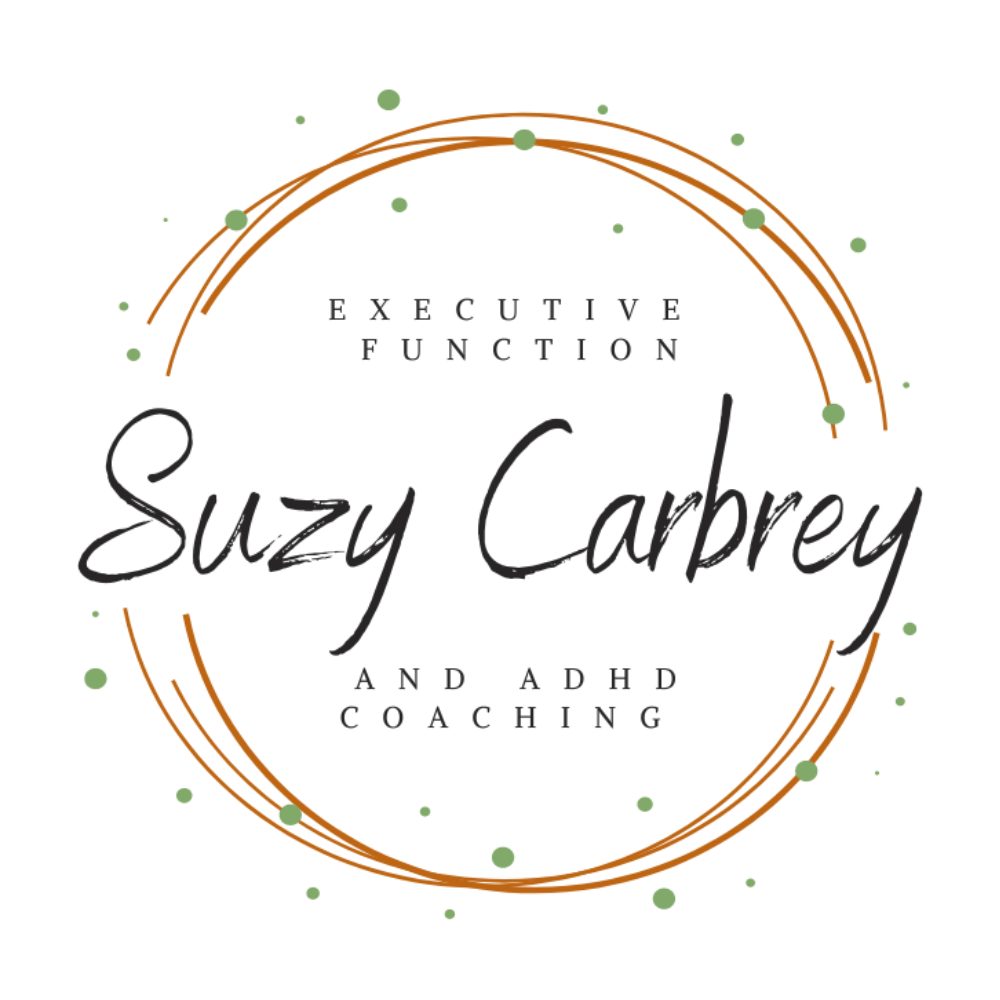Unleashing Potential is written by Suzy Carbrey ⧫
Navigating the demands of ADHD presents unique challenges, particularly in maintaining focus and productivity. This guide integrates two potent methodologies: a specialized reflection and planning practice designed for individuals with ADHD and Brian P. Moran’s transformative 12-Week Year process. Together, these approaches offer a comprehensive framework for goal planning among adults with ADHD, addressing the setting and achievement of goals, overcoming obstacles, and fostering continuous improvement in the face of ADHD-related challenges.
Goal planning poses distinct challenges for individuals with ADHD, given the cognitive and executive function difficulties associated with the condition. This section explores the reasons why goal planning can be challenging for those with ADHD and highlights the role of a flexible structure in overcoming these obstacles and unleashing potential.
Challenges in Goal Planning and Unleashing Potential for ADHD Individuals:
 Impaired Executive Functions:
Impaired Executive Functions:
ADHD often involves difficulties in executive functions, such as planning, organizing, initiating tasks, and maintaining focus. These challenges can make it hard to create and follow through on a structured plan.
Time Management Issues:
Individuals with ADHD may struggle with estimating and managing time effectively. This can lead to underestimating the time required for tasks or getting easily distracted, affecting goal progress.
Difficulty with Prioritization:
Prioritizing tasks can be challenging for those with ADHD. They may have difficulty determining which tasks are most important, leading to a lack of focus on key objectives.
Inconsistent Motivation:
ADHD can contribute to fluctuations in motivation levels. Tasks that were initially engaging may lose interest quickly, making it difficult to sustain effort over time.
Impulsivity:
Impulsivity is a common trait in ADHD, which can lead to spontaneous decisions and actions without considering the long-term consequences. This can interfere with goal planning and adherence.
The Role of a Flexible Structure for Unleashing Potential:
Accommodating Variability in Focus:
A flexible structure allows for variations in attention and focus. It recognizes that attention levels may fluctuate, and goals can be approached in a manner that aligns with the individual’s current cognitive state.
Adapting to Changing Priorities:
ADHD individuals may experience shifting priorities or interests. A flexible structure allows for adjustments in goals and objectives to align with changing circumstances without causing undue stress.
Reducing Perceived Rigidity:
A rigid goal-setting process can be overwhelming for individuals with ADHD. A flexible structure provides room for creativity and adaptation, making the planning process more accessible and less daunting.
Embracing Trial and Error:
Individuals with ADHD may encounter setbacks and obstacles. A flexible structure encourages a positive mindset by allowing for trial and error, fostering a learning environment where adjustments can be made based on experiences.
Mitigating Perfectionism:
ADHD individuals grappling with perfectionism benefit from a flexible structure that emphasizes adaptability over rigid standards. Creating an environment focused on progress rather than perfection fosters a sense of accomplishment, bolstering self-worth and contributing to a more positive and inclusive overall experience for individuals with ADHD.
Tailoring Goals for ADHD Success and Unleashing Potential:
 Setting Clear Goals and Objectives:
Setting Clear Goals and Objectives:
Initiating your journey towards enhanced productivity begins with clear goal-setting. Identify goals related to work, personal growth, or other aspects of life. Break these goals down into specific, actionable objectives that serve as the stepping stones toward your larger aspirations.
Motivation and Enjoyment Assessment:
Assessing motivation is key for each objective. Honestly evaluate your motivation for each task, you can rank each on a scale from 0 to 4. This step helps identify tasks that may require more effort to stay engaged with. Additionally, consider the enjoyment factor by rating activities associated with your objectives.
Alignment with Goals:
Ensure each objective aligns seamlessly with your overarching goals. Use a scale from 0 to 4 to gauge how closely each objective supports your overall aspirations. This step ensures consistency and relevance in your pursuits.
Reflecting on Progress and Challenges When Unleashing Potential
Follow-Up and Progress Evaluation:
After working on each objective, assess the effort required on a scale from 0 to 4. Track your progress on a scale from 0 to 4, acknowledging both completed and pending goals. This practice instills a sense of accomplishment and highlights areas needing more attention.
Quality Assessment and Barriers Identification:
Evaluate the quality of your work using a scale from 0 to 4. Recognize the level of effort and output to gain insights into your work habits. Identify barriers or challenges faced, such as forgetfulness, lack of knowledge, or motivation issues, for effective refinement.
 Practices for Optimal Results to Unleash Potential
Practices for Optimal Results to Unleash Potential
Establishing a Regular Rhythm:
Consistency is paramount in managing ADHD-related challenges. Dedicate a specific time for these self-check-ins in your routine – whether it’s a weekly review or a bi-weekly assessment. A set schedule ensures that reflection and planning become integral parts of your habitual rhythm.
Visual Supports for Organization:
Leverage visual aids such as calendars, charts, or to-do lists to enhance organization. Visual representations are potent tools for individuals with ADHD, aiding in maintaining focus, organization, and clarity on goals. These tangible aids serve as constant reminders and guides in your daily pursuits.
External Accountability:
Consider the strength of shared commitment by enlisting an accountability partner. Whether a friend, family member, or colleague, this person becomes a supportive ally in your goal journey. Regular check-ins with your accountability partner provide not only motivation but also an external perspective on your progress.
Mastering Productivity: Let’s Explore the 12-Week Year Process for Effective Goal Planning when Unleashing Potential:
 One innovative approach for goal setting and unleashing potential that has gained popularity in recent years is the 12-Week Year, pioneered by Brian P. Moran and Michael Lennington. This system is designed to enhance focus, execution, and accountability, allowing individuals to accomplish more in 12 weeks than they might have in an entire year. We will expand on goal planning for adults with ADHD and explore the step-by-step process of the 12-Week Year, including goal setting, weekly reflection, percentage scoring, and the importance of accountability partners.
One innovative approach for goal setting and unleashing potential that has gained popularity in recent years is the 12-Week Year, pioneered by Brian P. Moran and Michael Lennington. This system is designed to enhance focus, execution, and accountability, allowing individuals to accomplish more in 12 weeks than they might have in an entire year. We will expand on goal planning for adults with ADHD and explore the step-by-step process of the 12-Week Year, including goal setting, weekly reflection, percentage scoring, and the importance of accountability partners.
Step 1: Define Your Vision and 12-Week Goals
The 12-Week Year begins with a clear vision of your goals for the next 12 weeks. Take time to reflect on your long-term aspirations, both personally and professionally. What do you want to achieve in the 12 weeks? Break down these goals into key objectives that can be accomplished within 12 weeks.
Step 2: Establish Your 12-Week Goals
Select the most critical objectives from your annual goals to focus on during the next 12 weeks. These should be specific, measurable, achievable, relevant, and time-bound (SMART) goals. Moran emphasizes the importance of setting fewer goals to maintain focus and increase the likelihood of success.
Step 3: Weekly Planning and Execution
With your 12-week goals in mind, create a weekly plan that outlines the tasks and actions necessary to achieve them. Moran suggests prioritizing tasks based on their impact, ensuring that you allocate time to high-priority activities first. Stay committed to your weekly plan and be prepared to adapt as needed.
Step 4: Weekly Reflection
Reflection is a key component of the 12-Week Year process. At the end of each week, assess your progress and reflect on what went well and what could be improved. Consider how effectively you utilized your time and whether your actions aligned with your goals. This reflection process is crucial for continuous improvement and course correction.
Step 5: Percentage Scoring
Moran introduces the concept of percentage scoring to evaluate performance. At the end of each week, assess how much of your weekly plan was completed. The goal is to achieve a score close to 100%, indicating that you are consistently executing your plan. Use the percentage score as a metric for tracking progress and identifying areas for improvement.
Step 6: Accountability Partners
To enhance accountability, consider partnering with someone who shares similar goals. An accountability partner provides support, encouragement, and an external perspective on your progress. Regular check-ins with your partner can help you stay on track, share insights, and overcome challenges together.
 Conclusion: Harnessing Synergy for Sustainable Progress & Unleashing Potential
Conclusion: Harnessing Synergy for Sustainable Progress & Unleashing Potential
The regular practice of reflection and planning, combined with the dynamic principles of the 12-Week Year, creates a powerful synergy for goal planning and unleashing potential for adults with ADHD. By setting clear goals, assessing motivation, aligning objectives with goals, and evaluating progress, a structured approach is forged to tackle tasks effectively. This practice not only aids in organization but also boosts motivation and satisfaction with accomplishments, ultimately leading to greater success in managing ADHD-related challenges.
Establishing a regular rhythm, using visual supports, and having accountability partners further enhance the effectiveness of this approach. As you embark on this holistic journey, remember that progress is a continuous process, and by integrating these methodologies, you empower yourself to navigate challenges, achieve your goals, and thrive in all aspects of your life. Start implementing these strategies today and witness the transformative impact on your personal and professional journey to unleashing potential.
Ready to gain control and enhance your executive functioning? As an experienced and compassionate coach, I specialize in providing support for executive functioning and ADHD. To embark on your journey, please reach out to me at 708-264-2899 or email hello@suzycarbrey.com to schedule a FREE 20-minute discovery call consultation.
With a background as a speech-language pathologist, I have a strong foundation in executive functioning coaching. My graduate degree program in SLP placed a significant emphasis on cognition, including executive functions, and I have years of experience in medical rehabilitation, providing cognitive-communication therapy. Additionally, I have completed an ADHD Services Provider certification program, I am Solutions-Focused Brief Therapy Diamond Level 1 certified and I am trained in the Seeing My Time® executive functioning curriculum.
Experience the convenience and effectiveness of online coaching, backed by studies that demonstrate equal results to in-person services. Parents, professionals, and emerging adults love the convenience and privacy of receiving coaching from their own homes.
Whether you reside in Chicago, Milwaukee, Indianapolis, Kansas City, or anywhere else around the globe, I am here to assist you. Schedule your discovery call consultation today, and I eagerly anticipate the opportunity to work with you!
Please note that although I am a certified speech-language pathologist, all services Suzy Carbrey LLC provides are strictly coaching and do not involve clinical evaluation or treatment services. If you require a formal speech therapy evaluation and treatment, please inform me, and I can provide appropriate recommendations.

